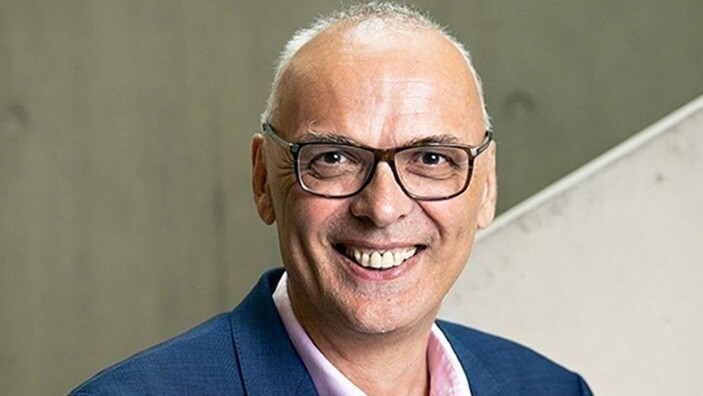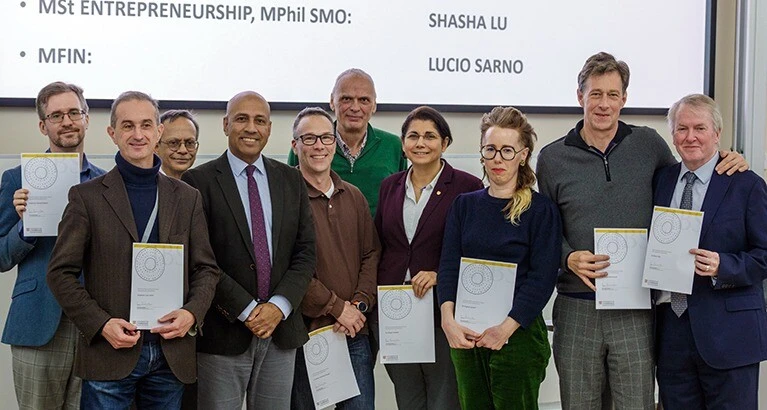Dennis Gillings Professor of Health Management
Director of the Centre for Health Leadership and Enterprise (CCHLE)
Diploma, PhD, Habilitation (Karlsruhe University)
My work addresses organisational and management challenges that impede innovation in healthcare delivery. I focus on scalable transformations and novel business models that enhance access and reduce costs, specifically targeting chronic disease management and prevention, and addressing health disparities.

Prospective PhD students
Research interests
The healthcare sector, while pivotal in significantly enhancing life expectancy over the past century, currently faces a paradigm shift. Rooted in a 20th-century delivery model centred around family doctors and general hospitals, this system now confronts the challenges of the 21st century – aging populations, escalating chronic diseases, and growing health disparities. This raises a critical question: can this traditional delivery system be adapted to effectively address these modern healthcare challenges, or is it a case of preparing for yesterday’s battles in today’s war?
Professor Stefan Scholtes’ extensive experience with hospitals and primary care practices not only underscores the need for these institutions to evolve, but also reveals a critical gap in the industry: there are jobs-to-be-done that neither hospitals nor traditional primary care practices can do well. This gap urgently needs to be filled by new delivery vehicles, which are pivotal in providing innovative solutions and tech-enabled strategies to effectively tackle the growing chronic disease crisis and deliver population health outcomes at scale.
Stefan’s research is divided into 3 main streams:
- Primary Care at Scale: Since 2018, Stefan has served as Chair of the Board at Granta Medical Practices in Cambridgeshire, which has evolved into one of England’s largest primary care practices. This role provides valuable insights into the opportunities and challenges of delivering primary care on a large scale while maintaining the essential GP-patient relationship.
- Healthcare Utilities: Developed in partnership with Carter Dredge, a Cambridge Judge Business Doctorate student and senior executive in a US health system, this initiative studies and supports a structural innovation in healthcare delivery. The aim is to establish not-for-profit businesses, termed healthcare utilities, that specifically target market inefficiencies in healthcare supply chains. These utilities ensure that vital technology remains both affordable and readily available. A prime example of this model’s success is Civica Rx, a non-profit generic drug manufacturer in the US that provides over 1,500 US hospitals with essential drugs at a stable low price, focusing on medications that are frequently impacted by shortages. Stefan and Carter are working closely with Civica Rx to study the extent to which the healthcare utility business model can be applied to resolving other critical supply challenges faced by health systems and payers.
- Centre for Global Healthcare Convergence: Co-founded with Cambridge Judge Fellow Anoop Maini, this initiative aims to address fragmentation in healthcare. Working alongside industry and academic partners, the Centre is pioneering the formation of businesses named Precision Population Health Solutions. Created as clinical franchises, these ventures integrate various healthcare components to deliver effective, turn-key solutions for specific patient groups, such as asthmatics, and scale best-in-class population health outcomes.
Professor Scholtes’ research across these 3 areas is directed towards shaping a new healthcare model. This model introduces a third delivery pillar, complementing the existing GP-Hospital framework, to enhance the overall healthcare system. Currently, primary and secondary care providers are local generalists, catering to local communities and treating a large range of conditions. While this approach is vital for overall healthcare, it is not as effective for tackling specific problems that require scale. The idea is to complement the existing delivery system with an ecosystem of specialised ventures, both non-profit and for-profit. These organisations will focus on addressing specific problems on a large scale. They operate in the ‘mezzanine’ space between primary and secondary care and are designed to plug seamlessly into existing local health systems. Professor Scholtes believes this focused strategy has the potential to catalyse the step-change improvements that we desperately need, help health systems to consistently achieve best-in-class population health outcomes, and reduce health disparities. This approach is key to adapting our healthcare systems to better meet the demands of the 21st century.
Professional experience
Professor Scholtes has over 2 decades of experience teaching MBA students and executives. His executive teaching focuses on the development and delivery of bespoke leadership programmes to support system change and transformation in healthcare.
Stefan’s research and teaching are embedded in close collaborations with executives in health systems, hospitals and primary care practices in the UK and the USA. He is Chair of the Board of Granta Medical Practices in Cambridgeshire and holds honorary appointments at Cambridge University Hospitals and the Royal Papworth Hospital. In 2011 he founded the Cambridge Centre for Health Leadership & Enterprise. Stefan is founding Department Editor for Healthcare Management at Management Science and serves as Distinguished Visiting Professor at HEC Paris.
Previous appointments
Stefan joined Cambridge Judge Business School in 1996 from the University of Karlsruhe. Prior to his appointment as Dennis Gillings Professor of Health Management in 2010, he was Professor of Management Science and Head of the Management Science subject area at Cambridge Judge.
Publications
Selected publications
- Kajaria-Montag, H., Freeman, M. and Scholtes, S. (2024) “Continuity of care increases physician productivity in primary care.” Management Science, 70(11): 7345-8215 (DOI: 10.1287/mnsc.2021.02015)
- Dredge, C. and Scholtes, S. (2023) “Vaccinating health care supply chains against market failure: the case of Civica Rx.” NEJM Catalyst Innovations in Care Delivery, 4(10) (DOI: 10.1056/CAT.23.0167)
- Dredge, C., Liljenquist, D. and Scholtes, S. (2022) “Disruptive collaboration: a thesis for pro-competitive collaboration in health care.” NEJM Catalyst Innovations in Care Delivery, 29 March 2022 (DOI: 10.1056/CAT.22.0057) (available online)
- Bobroske, K., Freeman, M., Huan, L., Cattrell, A. and Scholtes, S. (2022) “Curbing the opioid epidemic at its root: the effect of provider discordance after opioid initiation.” Management Science, 68(3): 2003-2015 (DOI: 10.1287/mnsc.2021.4252) (available online)
- Freeman, M., Robinson, S. and Scholtes, S. (2021) “Gatekeeping, fast and slow: an empirical study of referral errors in the emergency department.” Management Science, 67(7): 4209-4232 (DOI: 10.1287/mnsc.2020.3711)
- Freeman, M., Savva, N. and Scholtes, S. (2020) “Economies of scale and scope in hospitals: an empirical study of volume spillovers.” Management Science (DOI: 10.1287/mnsc.2019.3572) (published online May 2020)
Journal articles
- Dredge, C. and Scholtes, S. (2025) “Changing the script on drug pricing: a new type of supplier creates savings for patients and plans.” NEJM Catalyst Innovations in Care Delivery, 6(6) (DOI: 10.1056/CAT.24.0417)
- Kajaria-Montag, H., Scholtes, S., Pereira Gray, D., Sidaway-Lee, K., Freeman, M. and Evans, P. (2025) “Continuity and locum use for acute consultations: observational study of subsequent workload.” British Journal of General Practice, BJGP.2024.0312, 27 January 2025 (DOI: 10.3399/BJGP.2024.0312)
- Betcheva, L., Erhun, F., Feylessoufi, A., Fryers, P., Goncalves, P., Jiang, H., Kattuman, P., Pape, T., Pari, A., Scholtes, S. and Tyrrell, C. (2024) “An adaptive research approach to COVID-19 forecasting for regional health systems in England.” INFORMS Journal on Applied Analytics, 54(6): 455-574 (DOI: 10.1287/inte.2023.0009)
- Kajaria-Montag, H., Freeman, M. and Scholtes, S. (2024) “Continuity of care increases physician productivity in primary care.” Management Science, 70(11): 7943-7960 (DOI: 10.1287/mnsc.2021.02015)
- Miedaner, F., Kuntz, L., Ellermann, K., Roth, B. and Scholtes, S. (2024) “Service quality implications of long periods of consecutive working days: an empirical study of neonatal intensive care nursing teams.” Manufacturing and Service Operations Management, 26(4): 1422-1434 (DOI: 10.1287/msom.2022.0021)
- Dredge, C. and Scholtes, S. (2023) “Vaccinating health care supply chains against market failure: the case of Civica Rx.” NEJM Catalyst Innovations in Care Delivery, 4(10) (DOI: 10.1056/CAT.23.0167)
- Bobroske, K., Freeman, M., Huan, L., Cattrell, A. and Scholtes, S. (2022) “Curbing the opioid epidemic at its root: the effect of provider discordance after opioid initiation.” Management Science, 68(3): 2003-2015 (DOI: 10.1287/mnsc.2021.4252) (available online)
- Dredge, C., Liljenquist, D. and Scholtes, S. (2022) “Disruptive collaboration: a thesis for pro-competitive collaboration in health care.” NEJM Catalyst Innovations in Care Delivery, 29 March 2022 (DOI: 10.1056/CAT.22.0057) (available online)
- Dredge, C. and Scholtes, S. (2021) “The health care utility model: a novel approach to doing business.” NEJM Catalyst Innovations in Care Delivery, 8 July 2021 (DOI: 10.1056/CAT.21.0189) (available online)
- Freeman, M., Robinson, S. and Scholtes, S. (2021) “Gatekeeping, fast and slow: an empirical study of referral errors in the emergency department.” Management Science, 67(7): 4209-4232 (DOI: 10.1287/mnsc.2020.3711)
- Freeman, M., Savva, N. and Scholtes, S. (2021) “Economies of scale and scope in hospitals: an empirical study of volume spillovers.” Management Science, 67(2): 673–697 (DOI: 10.1287/mnsc.2019.3572)
- van der Schaar, M., Alaa, A.M., Floto, A., Gimson, A., Scholtes, S., Wood, A., McKinney, E., Jarrett, D., Lio, P. and Ercole, A. (2021) “How artificial intelligence and machine learning can help healthcare systems respond to COVID-19.” Machine Learning, 110(1): 1–14 (DOI: 10.1007/s10994-020-05928-x)
- KC, D.S., Scholtes, S. and Terwiesch, C. (2020) “Empirical research in healthcare operations: past research, present understanding, and future opportunities.” Manufacturing and Service Operations Management, 22(1): 73-83 (DOI: 10.1287/msom.2019.082)
- Han, L., Fine, J., Robinson, S.M., Boyle, A.A., Freeman, M. and Scholtes, S. (2019) “Is seniority of emergency physician associated with the weekend mortality effect? An exploratory analysis of electronic health records in the UK.” Emergency Medicine Journal, 36(12): 708-715 (DOI: 10.1136/emermed-2018-208114)
- Kuntz, L., Scholtes, S. and Sulz, S. (2019) “Separate and concentrate: accounting for patient complexity in general hospitals.” Management Science, 65(6): 2482-2501 (DOI: 10.1287/mnsc.2018.3064)
- Freeman, M., Savva, N. and Scholtes, S. (2017) “Gatekeepers at work: an empirical analysis of a maternity unit.”Management Science, 63(10): 3147-3167 (DOI: 10.1287/mnsc.2016.2512)
- Newnham, M., Bunclark, K., Abraham, N., Almeida, L.A., Cannon, J., Clare, S., Doughty, N., Dunning, J., Ng, C., Ponnaberanam, A., Scholtes, S., Sheares, K., Speed, N., Taboada, D., Toshner, M., Tsui ,S., Jenkins, D. and Pepke-Zaba, J. (2017) “Camphor score: sustained improvement in patient reported outcomes following pulmonary endarterectomy in chronic thromboembolic pulmonary hypertension.”Thorax, 72 (DOI: 10.1136/thoraxjnl-2017-210983.56)
- Smith, W.B., Steinberg, J., Scholtes, S. and Mcnamara, I.R. (2017) “Medial compartment knee osteoarthritis: age-stratified cost-effectiveness of total knee arthroplasty, unicompartmental knee arthroplasty, and high tibial osteotomy..”Knee Surgery, Sports Traumatology, Arthroscopy, 25(3): 924-933 (DOI: 10.1007/s00167-015-3821-3)
- Martani, C., Jin, Y., Soga, K. and Scholtes, S. (2016) “Design with uncertainty: the role of future options for infrastructure integration.”Computer-Aided Civil and Infrastructure Engineering, 31(10): 733-748 (DOI: 10.1111/mice.12214)
- Kuntz, L., Mennicken, R. and Scholtes, S. (2015) “Stress on the ward: evidence of safety tipping points in hospitals.”Management Science, 61(4): 754-771 (DOI: 10.1287/mnsc.2014.1917)
- Lee, Y.S. and Scholtes, S. (2014) “Empirical prediction intervals revisited.”International Journal of Forecasting, 30(2): 217-234 (DOI: 10.1016/j.ijforecast.2013.07.018)
- Savva, N. and Scholtes, S. (2014) “Opt-out options in new product co-development partnerships.”Production and Operations Management, 23(8): 1370-1386 (DOI: 10.1111/poms.12059)
- Kuntz, L. and Scholtes, S. (2013) “Physicians in leadership: the association between medical director involvement and staff-to-patient ratios.”Health Care Management Science, 16(2): 129-138 (DOI: 10.1007/s10729-012-9218-7)
- Eralp, M.N., Scholtes, S., Martell, G., Winter, R. and Exley, A.R. (2012) “Screening of healthcare workers for tuberculosis: development and validation of a new health economic model to inform practice.”BMJ Open, 2(2): 0- (DOI: 10.1136/bmjopen-2011-000630)
- Welbourne, J., Gupta, A., Scholtes, S., Dean, J. and Ahluwalia, J. (2012) “Training: where tomorrow’s leaders hit new heights.” Health Service Journal, 122(6327): 19-21
- Ching, W.K., Scholtes, S. and Zhang, S.Q. (2011) “Numerical algorithms for dynamic traffic demand estimation between zones in a network.”Engineering Optimization, 36(3): 379-400 (DOI: 10.1080/0305215042000267045)
- de Neufille, R., Hodota, K., Sussman, J. and Scholtes, S. (2008) “Real options to increase the value of intelligent transportation systems.”Transportation Research Record, (2086): 40-47 (DOI: 10.3141/2086-05)
- Kuntz, L., Scholtes, S. and Vera, A. (2008) “DRG cost weight volatility and hospital performance.”OR Spektrum, 30(2): 331-354 (DOI: 10.1007/s00291-006-0063-2)
- Mason, R., Savva, N. and Scholtes, S. (2008) “The economics of licensing contracts.”Nature Biotechnology, 26(8): 855-857 (DOI: 10.1038/bioe.2008.7)
- Kuntz, L., Scholtes, S. and Vera, A. (2007) “Incorporating efficiency in hospital-capacity planning in Germany.”European Journal of Health Economics, 8(3): 213-223 (DOI: 10.1007/s10198-006-0021-6)
- Kuosmanen, T., Post, T. and Scholtes, S. (2007) “Non-parametric tests of productive efficiency with errors-in-variables.”Journal of Econometrics, 136(1): 131-162 (DOI: 10.1016/j.jeconom.2005.08.003)
- de Neufville, R., Scholtes, S. and Wang, T. (2006) “Real options by spreadsheet: parking garage case example.”Journal of Infrastructure Systems, 12(2): 107-111 (DOI: 10.1061/(ASCE)1076-0342(2006)12:2(107))
- Fletcher, R., Leyffer, S., Ralph, D. and Scholtes, S. (2006) “Local convergence of SQP methods for mathematical programs with equilibrium constraints.”SIAM Journal on Optimization, 17(1): 259-286 (DOI: 10.1137/S1052623402407382)
- Demiguel, V., Friedlander, M.P., Nogales, F.J. and Scholtes, S. (2005) “A two-sided relaxation scheme for mathematical programs with equilibrium constraints.”SIAM Journal on Optimization, 16(2): 587-609 (DOI: 10.1137/04060754x)
- Scholtes, S. (2004) “Nonconvex structures in nonlinear programming.”Operations Research, 52(3): 368-383 (DOI: 10.1287/opre.1030.0102)
- Scheel, H. and Scholtes, S. (2003) “Continuity of DEA efficiency measures.” Operations Research, 51(1): 149-159
- Scholtes, S. (2001) “Convergence properties of a regularization scheme for mathematical programs with complementarity constraints.” SIAM Journal on Optimization, 11(4): 918-936
- Scholtes, S. and Stohr, M. (2001) “How stringent is the linear independence assumption for mathematical programs with complementarity constraints?” Mathematics of Operations Research, 26(4): 851-863
- Kuntz, L. and Scholtes, S. (2000) “Measuring the robustness of empirical efficiency valuations.” Management Science, 46(6): 807-823
- Scheel, H. and Scholtes, S. (2000) “Mathematical programs with complementarity constraints: stationarity, optimality, and sensitivity.” Mathematics of Operations Research, 25(1): 1-22
- Scholtes, S. and Stohr, M. (1999) “Exact penalization of mathematical programs with equilibrium constraints.” SIAM Journal on Control and Optimization, 37(2): 617-652
- Agrachev, A.A., Pallaschke, D. and Scholtes, S. (1997) “On Morse theory for piecewise smooth functions.”Journal of Dynamical and Control Systems, 3(4): 449-469 (DOI: 10.1007/bf02463278)
- Ralph, D. and Scholtes, S. (1997) “Sensitivity analysis of composite piecewise smooth equations.” Mathematical Programming, 76(3): 593-612
- Scholtes, S. (1996) “A proof of the branching number bound for normal manifolds.” Linear Algebra and Its Applications, 246: 83-95
- Scholtes, S. (1996) “Homeomorphism conditions for coherently oriented piecewise affine mappings.” Mathematics of Operations Research, 21(4): 955-978
- Bartels, S.G., Kuntz, L. and Scholtes, S. (1995) “Continuous selections of linear functions and nonsmooth critical point theory.”Nonlinear Analysis, Theory, Methods and Applications, 24(3): 385-407 (DOI: 10.1016/0362-546x(95)91645-6)
- Kuntz, L. and Scholtes, S. (1995) “Qualitative aspects of the local approximation of a piecewise differentiable function.”Nonlinear Analysis, Theory, Methods and Applications, 25(2): 197-215 (DOI: 10.1016/0362-546x(94)00202-s)
- Kuntz, L. and Scholtes, S. (1994) “A nonsmooth variant of the Mangasarian-Fromovitz constraint qualification.”Journal of Optimization Theory and Applications, 82(1): 59-75 (DOI: 10.1007/bf02191779)
- Kuntz, L. and Scholtes, S. (1994) “Structural analysis of nonsmooth mappings, inverse functions, and metric projections.”Journal of Mathematical Analysis and Applications, 188(2): 346-386 (DOI: 10.1006/jmaa.1994.1431)
- Kuntz, L. and Scholtes, S. (1993) “Constraint qualifications in quasidifferentiable optimization.”Mathematical Programming, 60(1-3): 339-347 (DOI: 10.1007/bf01580618)
- Scholtes, S. (1992) “Minimal pairs of convex bodies in two dimensions.”Mathematika, 39(2): 267-273 (DOI: 10.1112/s002557930001500x)
Books, monographs, reports and case studies
- Scholtes, S. (2015) “Reorganising care at Cambridge University Hospitals.” Cambridge Judge Business School Case Study.
- Scholtes, S. (2012) Introduction to piecewise differentiable equations. New York, NY: Springer.
- de Neufville, R. and Scholtes, S. (2011) Flexibility in engineering design. Cambridge, MA: MIT Press.
- Powell, M.J.D. and Scholtes, S. (eds.) (2000) System modelling and optimization: methods, theory and applications. Boston, MA: Kluwer Academic.
News and insights
Faculty news
2025 Cambridge Judge excellence in teaching awards
Eleven members of the Cambridge Judge Business School faculty are awarded teaching prizes for excellence across the Business School’s various programmes.
Generic drugs can be supplied at savings of over 60% for patients and 90% for payers through a health care utility model that emphasises reliable supply at affordable cost rather than profits, says a new study from Cambridge Judge Business School and US healthcare firm Intermountain Health.
Operations management
How repeat visits to the same GP can save cost and boost healthcare outcomes
Continuity of care through seeing the same GP regularly helps patients, doctors and hospitals, says a series of studies co-authored by Professor Stefan Scholtes.
Media coverage
India Education Diary | 10 October 2022
University of Cambridge – Vice Chancellor’s awards for research impact and engagement 2022
Stefan Scholtes, Dennis Gillings Professor of Health Management at Cambridge Judge Business School and Director of the Centre for Health Leadership & Enterprise, has won the Collaboration Award from the University of Cambridge’s Vice Chancellor’s Awards for Research Impact and Engagement, for playing a pivotal part in enabling evidence-informed healthcare decision making during the COVID-19 crisis through his work in partnership with Public Health England (PHE) and the NHS in the East of England.
United Press International | 22 June 2021
Study: Second opinion can reduce risk for long-term opioid use
A study looking at opioid use co-authored by Stefan Scholtes, Dennis Gillings Professor of Health Management at Cambridge Judge Business School, featured in United Press International. The study found that “a “second opinion” by another prescribing doctor within 30 days of an initial opioid prescription reduced long-term opioid use after 12 months by 31%.
Management Science Review Blog | 25 March 2021
A route to decomplexifying hospitals
Hospitals are some of the most managerially intractable institutions in the annals of capitalism.” This is the stark conclusion that Clayton Christensen, Grossman and Hwang draw in their seminal book The Innovator’s Prescription, write co-authors Michael Freeman, Nicos Savva, and Professor Stefan Scholtes of Cambridge Judge Business School in a blogpost for the Management Science Review blog. Few doctors and hospital managers would disagree, if anything, that today the trend is towards larger and more complex hospitals, which does little to improve managerial (in)tractability. This leaves us with a challenge: How does one make hospitals manageable again while still maintaining or even improving the value of hospital services?
University of Cambridge, 6 November 2019
Admitting patterns of junior doctors may be behind ‘weekend effect’ in hospitals, study suggests
Cambridge Independent, 17 January 2018
Stabilising the patient and curing the ills of the NHS




